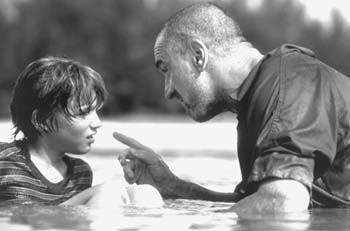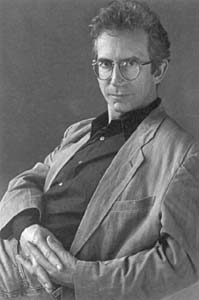Season of the Magwitch
Swamp Thing: Robert De Niro's thinly disguised version of Charles Dickens' Magwitch lays a finger on young Finn (Jeremy James Kissner) in the new film of 'Great Expectations.'
Dickens' 'Great Expectations' gets stretched to fit modern tastes in new film and book adaptations
By Richard von Busack
ABEL MAGWITCH rises out of the mists of Romney Marsh one Christmas Eve in the pages of Charles Dickens' 1860-61 novel Great Expectations. Finlay Currie, as the criminal Magwitch, glowers in the half-light in David Lean's 1946 film version, handily the best of the six screen takes on the famous tale.
On the movie screens of 1998, in the modernized adaptation of Great Expectations, Magwitch emerges, with a new name, Lustig, from the waters of the Gulf of Mexico: the orange-reddish reflection of his prison jumpsuit seen first, then the shaven head of star Robert De Niro.
Magwitch, thinly veiled as Maggs, is also the main character in a parallel version--"a riff," says the author--in Peter (Oscar and Lucinda) Carey's new novel, Jack Maggs (Knopf; $24).
Magwitch is the axle on which Great Expectations turns. In Dickens, he is a complex villain who brings both wealth and shame. In the new film version, Lustig is a prosperous Mafia hit man. In turn, author Carey has turned Magwitch into a sort of national myth for Australia, and his novel brings to the fore the deeper currents of money and morals that are missing from the film, for all of its flash and surface elegance.
There's no easy summarizing of Dickens' novel. The elderly recluse Miss Havisham has raised her adopted daughter, Estella, as a weapon against men. A beautiful, emotionless girl, Estella will grow to take the elderly woman's revenge upon men for the mind-snapping experience of having been ditched at the altar.
The neglected country boy Pip is brought to Havisham's lonely mansion as a companion for Estella, who is sharpened on the boy by Miss Havisham as a knife is sharpened on a whetstone. Later in life, still longing for the untouchable Estella, Pip begins to receive large sums of money from an unknown source.
He believes that the cash is from Havisham. To his vast fear and humiliation, it turns out that the money comes from the escaped convict Magwitch. Many years before, when Pip was a child, he was terrorized into bringing food and brandy to Magwitch, who was hiding out in chains in a swamp. Years later, having snuck back to England from exile under penalty of death, Magwitch exults in helping the child who once helped him: "I've lived rough, that you should live smooth."
Magwitch shows up the pride and prejudice of society and displays the weakness in the callow young hero. And at the end, Magwitch reveals his own misguided nobility when he pays as villains must always pay.
ONE WAY OF looking at Great Expectations is to suspect that it whispers the same moral stated outright by Dickens' contemporary Balzac: "Behind every great fortune is a crime." As George Orwell once remarked, however, Dickens' success as a writer was in attacking everybody and offending nobody, as if you had struck an elephant with a cane, and the beast considered it a good tickle.
The new film version doesn't even try to tickle society; it saves the title but changes the names. Pip is called Finnegan "Finn" Bell, a young Florida kid who becomes a big noise in the '80s art world. "Ms. Dinsmoor," the Havisham character, is played by Anne Bancroft as a zombie Blanche DuBois, with a magnified makeup mirror (a la Terry Gilliam's Brazil). Gwyneth Paltrow turns Estella from a figurative cocktease to a literal one, through plentiful use of a skinny body double.
Some choices work well in the new film. Havisham's manor, Satis House, here called Dinsmoor House, is a beautiful jungle ruin in the Gulf Coast, and I admired the economy of the way De Niro's Lustig spills the beans in one half-muttered line. This Great Expectations is built on Dickens' fine literary skeleton; its bones are even better than Paltrow's fine bones. Truly, as Joe Bob Briggs likes to say, here is a plot that doesn't get in the way of the story.
Making Lustig a Mafia hit man rather than a desperate petty criminal, however, undoes a significant aspect of this unruinable story. The tweaking of the new film version hides both the compassion and the snobbery underneath Dickens' humanitarianism.
The entire novel of Great Expectations online.
Official site for the new movie version of Great Expectations.
The opening pages of Peter Carey's novel, Jack Maggs.
This snobbery struck novelist Carey on his first reading of Great Expectations years ago. "My first childish impulse," Carey says, "was to get mad at Dickens for caricaturing my ancestors as Magwitch." Carey is speaking metaphorically--the Australian novelist sees Magwitch as a national forefather.
"I recognize Magwitch was an ancestor in a sense, that the Australian national character was deeply affected by its beginnings as a penal colony," Carey says. "Being an ex-penal colony had a huge effect on Australia, though it's never talked about much. My grandfather talked about England being horrible without being there."
Jack Maggs is set in England in 1837, the year of Victoria's ascension to the throne, the beginning of decades of change, of the middle class taking the whip hand. Carey reverses the basic story to make Maggs the hero and Pip (called "Phipps") a decadent English snob, as if Magwitch's plan to aid the boy had succeeded all too well.
"So, here's this guy, Maggs, cast out from this motherland," Carey explains. "He undergoes privation and torture and suffers terribly. He has a conditional pardon, that is, he's free to stay in the colony of Australia. What does he want to do? Go back to England to see the replica of an English gentleman he had made [with his money]. A very Australian thing to do--it's the mirror of the relationship of an abused child to an abusive parent."
The old word mag means a chatterbox; the name is ironic. Maggs is a grim ex-con who had been transported to New South Wales. Risking hanging, he sneaks back into England to find Phipps. As he hides out, he accidentally lands a servant's position in the badly run household of the newly rich Mr. Buckle, a Dickensian funny little man, who turns out to have a nasty, predatory streak. The most noted guest at the house of Buckle is the celebrated novelist Mr. Tobias Oates, who has a good deal in common with the real-life Charles Dickens. When we meet Oates, he has just taken up the hobby of hypnotism, which he tries out on Buckle's lumbering, intimidating new footman.
"There were, as in all crooked businesses, two sets of books," Carey writes. Oates claims that he's trying a talking cure to free Maggs of facial neuralgia, but he's actually picking Maggs' brain, transcribing his memories so that he can retell them in his novel The Death of Jack Maggs.
What Maggs fails to realize in his search for the refashioned Phipps is that he himself is already a new creature, an Australian. His arrival in London totters the social hierarchy, just as the ex-colonized turned the world upside down in the decades after Jack Maggs takes place, when the British caste system was shaken up by former subjects in Canada, Australia and, of course, America. These colonials flourished so well that only snobbery was left to comfort the English upper class at the sight of all that affluence in the hands of their lessers.
THE ONE THING Dickens' Pip doesn't have to be taught is that where the money comes from is just as important as having it. Dickens' Magwitch doesn't offer Pip thieves' silver; he's been sending money from a fortune that he made working as a sheepman in Australia, where he was exiled by the British government. (Carey's Maggs makes his money from a brickyard--some unworkable farmland he was issued turns out to be a huge clay pit perfect for making bricks.)
Still, Magwitch's money is a convict's money no matter how it's earned, and this is the initial embarrassment for Pip. To make the new film version resonant--or as resonant as it gets--Ethan Hawke's Finn is an artist ashamed of being patronized. He believes that his success as an artist has somehow been rigged by Lustig.
We are supposed to imagine that Finn's shame comes because his success is bought, even though the possibility of an artist avoiding "tainted" money is, as always, unlikely. It was especially unlikely in a decade remembered for corporate chicanery and high art prices. The really successful '80s artists took Warhol's way. The likes of Koons and Schnabel embraced the tainted money, rolling in it, covering themselves all over like the Royal Nonesuch in the story about that other Finn, Huckleberry. Since Finn is the hero, he deserves to be shown the money; what repels him from the art scene is the coterie of rude snobs who run it.
There's a Hindu proverb that goes "He who is under another's thumb has no rest even in dreams." Both Carey's Maggs and Dickens' Magwitch, in their doomed attempts to please the social order they wronged, are cursed with the dream of turning a surrogate self into a gentleman.
Lustig, on the other hand, is very much the cock-of-the-walk wise guy and harbors no such dreams. The matter of Magwitch's guilt has been fatally fudged in the new film. Did his punishments far outstrip his crimes? Was there a reason why Lustig went bad?
Critic James Agee noted that the 1946 version of Great Expectations had some Marxian touches. It's hard to forget the tracking shot of Magwitch as he stands in the courtroom with a dozen other chained, ruined men--chained and ruined, we were urged to remember, by the cruel side of 19th-century society.
In Dickens, the jailed Magwitch had been examined by phrenologists, those pseudoscientists who once believed that the size of the skull determined the evil of the brain. Magwitch comments bitterly, "They a measured my head, some of 'em--they had better a measured my stomach."
Dickens was no proto-Marxist, but he understood that the cause of crime wasn't in the lumps on a head but in how those lumps got there. In our era of prison-packing, mandatory sentencing and plenty of executions, Dickens' compassion toward the shadows of Magwitch's life has been discarded to please a modern movie audience.
[ San Jose | Metroactive Central | Archives ]
Copyright © Metro Publishing Inc. Maintained by Boulevards New Media.
![]()

Magali Pirard
Let It Rain: Finn (Ethan Hawke) and Estella (Gwyneth Paltrow) don't give a Dickens.![[line]](/gifs/line.gif)
![[line]](/gifs/line.gif)

Upending Dickens: Novelist Peter Carey has turned 'Great Expectations' into a kind of national myth for Australia.
From the February 19-25, 1998 issue of Metro.
![[Metroactive Books]](/books/gifs/books468.gif)